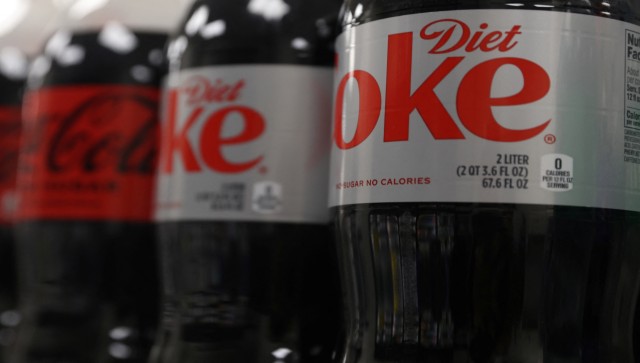A popular low-calorie artificial sweetener named “aspartame” is in question, decades after it was authorised for use in the United States.
Global health organisations are reassessing the safety of sugar replacement and looking into any potential links to cancer.
This month, the International Agency for Research on Cancer (IARC), a division of the World Health Organisation , examined the sweetener’s potential carcinogenic effects, according to Reuters.
The Joint Expert Group on Food Additives, a separate WHO and UN group, is currently revising its risk assessment and defining an acceptable daily consumption. They have not yet made their conclusions known, but they will do so on 14 July.
Also read: Not a Mix-Up: Why people are adding salt to their coffee instead of sugar
The sweetener in question – Aspartame
According to the US National Library of Medicine, aspartame is a popular low-calorie artificial sweetener that is 200 times sweeter than sucrose (ordinary sugar). Because of the possibility of the sweetness dwindling at high temperatures, it cannot be used for baking or frying.
Aspartame is used in around 90 per cent of ready-to-drink teas and about 95 per cent of carbonated soft drinks with added sugar, which accounts for a sizable portion of the beverage market. It is utilised in drinks like Mountain Dew Zero Sugar, Diet Mountain Dew, Sprite Zero, Coke Zero Sugar, and Diet Coke. Other goods that contain it include toothpaste, cough drops, and chewing gum.
According to the food product it is being used in, India’s food safety and regulation organisation FSSAI has advised maximum allowable quantities of the artificial sweetener in a paper from 2009, as per NDTV.
Aspartic acid and phenylalanine, two naturally occurring amino acids found in many foods high in protein, make up the sweetener. Aspartame is broken down by the body into its component parts, aspartic acid, phenylalanine, and a trace quantity of methanol. This non-nutritive sweetener’s (NNS) safety has never been without debate. Chemist James M Schlatter introduced the substance, and it was first used to replace sucrose in 1965, reported India Today.
Schlatter, who worked for GD Searle and Company, which would later merge with Pfizer, was working on an anti-ulcer medicine when he discovered the sweet taste of aspartame. The business began the procedure to get it certified for ingestion after realising its potential as a sugar alternative.
Aspartame has undergone numerous reviews by the US Food and Drug Administration, which authorised it for use in select dry foods in 1981 and fizzy drinks in 1983. More than 90 nations have approved its use, including the UK, Spain, France, Italy, Denmark, Germany, Australia, and New Zealand.
In advance of the WHO analysis, the FDA revised its webpage on aspartame and other sweeteners. It claims to monitor the most recent scientific findings and consumer exposure to sweeteners, and it refers to aspartame as “one of the most studied food additives in the human food supply.”
Also read: 5 common myths related to sugar that you may have heard of
Risk of cancer
According to the website News Medical, aspartame is hydrolyzed and absorbed in the gastrointestinal (GI) tract after consumption. The result of this process is the release of phenylalanine, aspartic acid, and methanol. Methanol is first converted to formaldehyde in the liver before being further converted to formic acid. In addition to the direct harm that methanol does to the liver, formaldehyde is also harmful to liver cells directly and is linked to the development of cancer.
Studies have looked into the possibility that aspartame causes cancer. For instance, rat research indicated that early aspartame exposure increased the likelihood that rat pups would later develop cancer.
Numerous regulatory organisations, including IARC, have begun to reevaluate the safety of aspartame for human consumption in light of massive studies suggesting a possible role for aspartame in the development of cancer. Similarly, the findings from these experiments have backed up a limited number of human investigations.
The ingestion of aspartame has been linked to an elevated risk of cancer, according to a recent population-based study from France. These people were discovered to have a heightened risk of developing breast cancer as well as malignancies linked to obesity, such as colon, stomach, liver, mouth, pharynx, larynx, oesophagal, ovarian, endometrial, and prostate cancers, according to the website.
It followed a study from the Ramazzini Institute in Italy in the early 2000s, which reported that some cancers in mice and rats were linked to aspartame, reported Reuters.
These findings support the unique influence of aspartame on specific cancer risks. Whereas aspartame does not appear to influence the risk of developing pancreatic cancer, men who consume aspartame appear to be at a greater risk of developing non-Hodgkin’s lymphoma and multiple myeloma.
Recent recipe tweaks by soft drinks giant Pepsico (PEP.O) demonstrate the struggle the industry has when it comes to balancing taste preferences with health concerns. Pepsico removed aspartame from sodas in 2015, bringing it back a year later, only to remove it again in 2020.
Also read: Explained: Why India is likely to ban sugar exports
Other health concerns
According to Dailymail, there are numerous general health problems, such as headaches, lightheadedness, and upset stomachs, linked to aspartame. Blind studies, in which individuals are unaware of whether the product they are consuming contains the sweetener, have not been able to duplicate this.
Broader health issues, however, have been raised for years, such as the possibility that they contribute to obesity by raising people’s appetites, causing cancer, changing the gut microbiome, and even promoting depression. However, following “a rigorous safety assessment,” health and food officials have consistently deemed them safe for use.
There is one exception, and that is for those who have an uncommon genetic disorder known as phenylketonuria. The amino acid “phenylalanine” cannot be processed by those who have this condition, eventually harming their key organs. Thus, it is necessary that aspartame must be disclosed as an ingredient in items that contain it. Only one in ten thousand people actually have the disease.
Also read: Ditch the Diet Cola: Why using sugar alternatives won’t help you lose weight
The debate
According to media sources, the IARC will probably categorise food ingredients into four groups. Group 1 consists of substances that cause human cancer, Group 2A is likely to cause human cancer, Group 2B may do so, and Group 3 is unclassifiable. The levels are based on the strength of the evidence, rather than how dangerous a substance is.
The issue is that this classification doesn’t indicate how hazardous these compounds might be. Prior to now, there has been a lot of misunderstanding due to the IARC classification of meat.
National regulators and the Joint Expert Committee on Food Additives (JECFA) of the World Health Organisation and the Food and Agriculture Organisation provide the advice. The usage of aspartame is being examined by JECFA, which is expected to release its conclusions on 14 July — the same day that IARC makes its verdict public.
Since 1981, JECFA has said aspartame is safe to consume within accepted daily limits, according to Reuters. For example, an adult weighing 60 kilograms (132 pounds) would have to drink between 12 and 36 cans of diet soda – depending on the amount of aspartame in the beverage – every day to be at risk. Its view has been widely shared by national regulators, including in the United States and Europe.
The backlash
Some of the most well-known brands in the world will be impacted by the decision, which will cause shockwaves in the global food manufacturing business. Aspartame and other artificial sweeteners are widely used now as a result of a significant campaign to reduce sugar consumption over the past few decades.
The classification system employed by the WHO’s subsidiary agency, the International Agency for Research on Cancer (IARC), was called “dumb” by experts, who also contended that “the dose makes the poison.” Aspartame and other artificial sweeteners do not cause cancer, according to Cancer Research UK.
The International Sweeteners Association — which counts PepsiCo and Skittles maker Mars Wrigley among its members — said it has “serious concerns with preliminary speculation about the IARC opinion.”
“IARC is not a food safety body,” said Frances Hunt-Wood, secretary general of the International Sweeteners Association in a statement. “No conclusions can be drawn until both reports are published. Aspartame is one of the most thoroughly researched ingredients in history, with over 90 food safety agencies across the globe declaring it is safe.”
The International Council of Beverages Associations, a trade organisation for the non-alcoholic beverage industry, executive director Kate Loatman said public health authorities should be “deeply concerned” by the “leaked opinion,” and also warned it “could needlessly mislead consumers into consuming more sugar rather than choosing safe no- and low-sugar options.”
In 2015, the IARC committee concluded that glyphosate is “probably carcinogenic.” Years later, even as other bodies like the European Food Safety Authority (EFSA) contested this, companies were still feeling the effects of the decision. Germany’s Bayer (BAYGn.DE) in 2021 lost its third appeal against US court verdicts that awarded damages to customers blaming their cancers on the use of its glyphosate-based weedkillers.
The IARC’s decisions have also faced criticism for sparking needless alarm over hard-to-avoid substances or situations.
With inputs from Reuters
Read all the Latest News , Trending News , Cricket News , Bollywood News , India News and Entertainment News here. Follow us on Facebook , Twitter and Instagram .


)




)
)
)
)
)
)
)
)